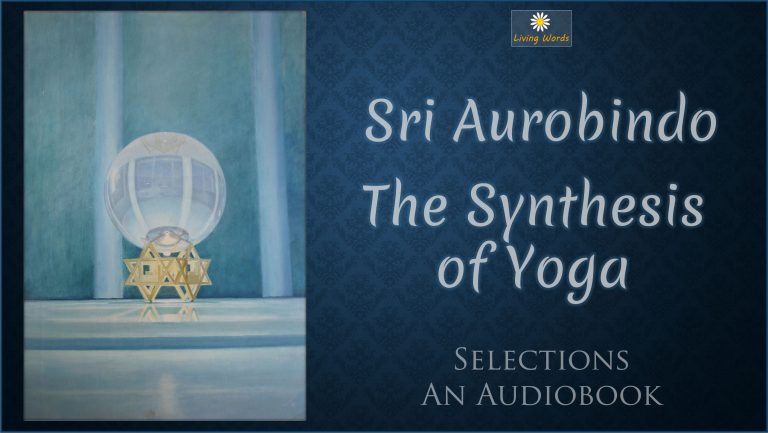... we shall have the same equality of mind and soul towards all happenings, painful or pleasurable, defeat and success, honour and disgrace, good repute and ill-repute, good fortune and evil fortune. For in all happenings we shall see the will of the Master of all works and results
At the Feet of The Mother
Selections from The Synthesis of Yoga
Selections from “The Synthesis of Yoga” by Sri Aurobindo
Total duration 3 hrs 42 minutes, recorded by Gopal Naik.
AUDIO PLAYER: listen to all tracks at once HERE
AUDIO ARCHIVE: download all tracks at once HERE
POSTS with audio and text of each selection are below
Our faith, persevering, will be justified in its works and will be lifted and transfigured at last into the self-revelation of a divine knowledge [...] At the end, the flickerings of faith will cease; for we shall see his face and feel always the Divine Presence.
Our sins are the misdirected steps of a seeking Power that aims, not at sin, but at perfection, at something that we might call a divine virtue. Often they are the veils of a quality that has to be transformed and delivered out of this ugly disguise ...
Our nature is not only mistaken in will and ignorant in knowledge but weak in power; but the Divine Force is there and will lead us if we trust in it and it will use our deficiencies and our powers for the divine purpose.
The first step on this long path is to consecrate all our works as a sacrifice to the Divine in us and in the world; this is an attitude of the mind and heart, not too difficult to initiate, but very difficult to make absolutely sincere and all-pervasive.
A Divine Power works in this mind and body and it is the same that works in all men and in the animal, in the plant and in the metal, in conscious and living things and in things apparently inconscient and inanimate.
"...after we have entered the path, he envelops us with his wide and mighty liberating Impersonality or moves near to us with the face and form of a personal Godhead. In and around us we feel a Power that upholds and protects and cherishes; we hear a Voice that guides; a conscious Will greater than ourselves rules us"
The desire of personal salvation, however high its form, is an outcome of ego; it rests on the idea of our own individuality and its desire for its personal good or welfare
The way of integral knowledge supposes that we are intended to arrive at an integral self-fulfilment and the only thing that is to be eliminated is our own unconsciousness, the Ignorance and the results of the Ignorance.
By concentration on anything whatsoever we are able to know that thing, to make it deliver up its concealed secrets; we must use this power to know not things, but the one Thing-in-itself.
The first step in concentration must be always to accustom the discursive mind to a settled unwavering pursuit of a single course of connected thought on a single subject and this it must do undistracted by all lures and alien calls on its attention.
Self-will in thought and action has [...] to be renounced if we are to be perfect in divine knowledge. This self-will means an egoism in the mind which attaches itself to its preferences, its habits, its past or present formations of thought and view and will because it regards them as itself or its own
... we are impelled to drape ourselves in the vow of poverty, or in the garb of service, or in outward proofs of indifference and renunciation and a spotless sainthood because that is what tradition and opinion demand of us and so we can make best an impression on our environment. But all this is vanity and delusion.
"... we may even say that a complete external renunciation is a stage through which the soul must pass at some period of its progress,—though always it should be without those self-willed violences and fierce self-torturings which are an offence to the Divine seated within us."
... we have not either to be affected in mind by hunger or thirst or discomfort or ill health or attach the importance which the physical and vital man attaches to the things of the body, or indeed any but a quite subordinate and purely instrumental importance.
Hope and fear, joy and grief, liking and disliking, attraction and repulsion, content and discontent, gladness and depression, horror and wrath and fear and disgust and shame and the passions of love and hatred fall away from the liberated psychic being.
... in all he [Yogin] sees God, sees the supreme reality, and his motive of work is to help mankind towards the knowledge of God and the possession of the supreme reality. He sees God through the data of science, God through the conclusions of philosophy, God through the forms of Beauty and the forms of Good, God in all the activities of life
Necessarily in the end prayer either ceases in the greater thing for which it prepared us, —in fact the form we call prayer is not itself essential so long as the faith, the will, the aspiration are there,—or remains only for the joy of the relation.


